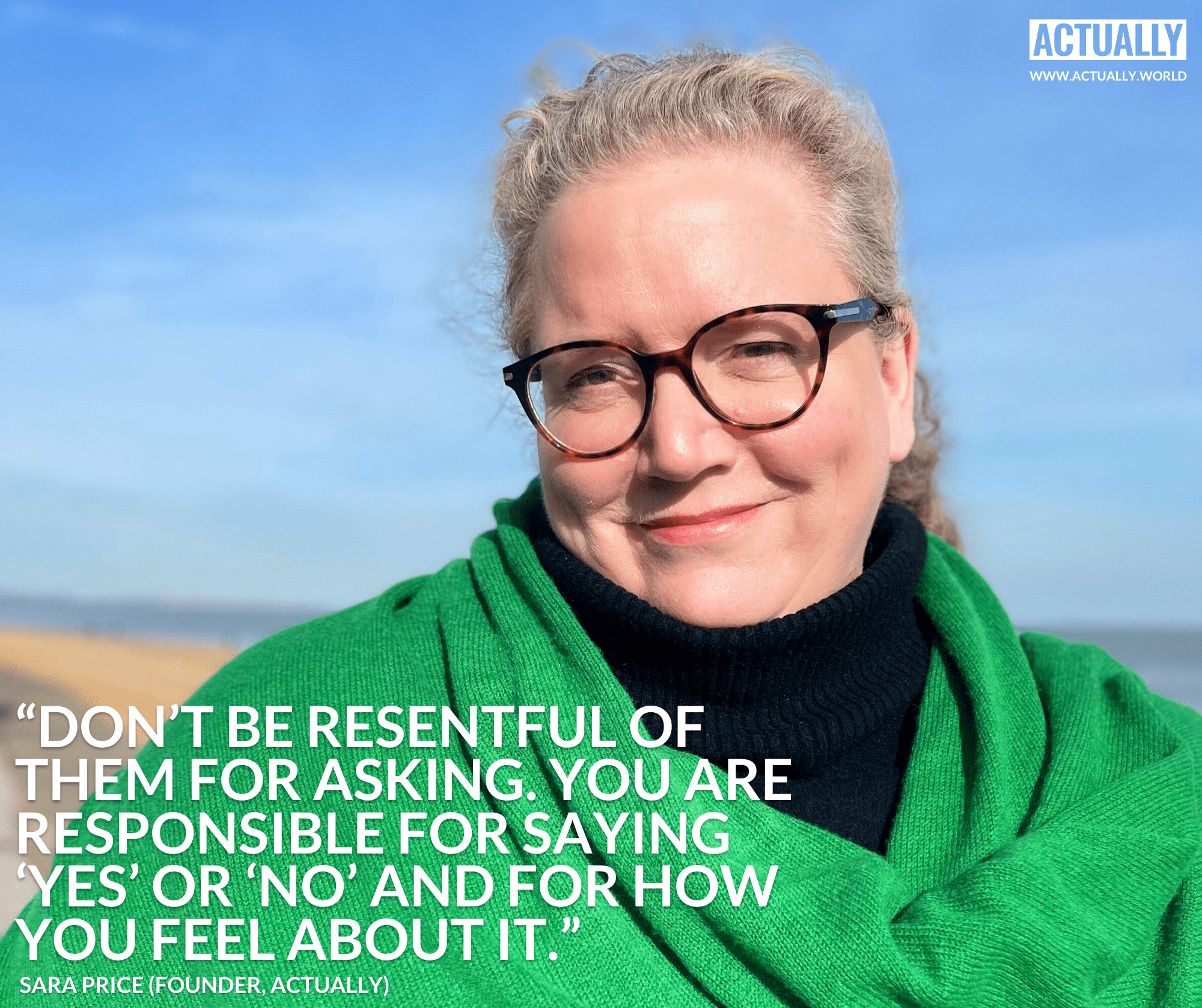Sara’s Surgery: How to deal with Pro Bono requests
Sara’s Surgery is a new series of blogs, social media content and the occasional newsletter in which I will be answering some of the most common questions that I am asked by members of the Actually community.
If you have a question that you’d like me to tackle, please email talk@actually.world using the subject line: Sara’s Surgery.
______
Dear Sara,
I have just spent nearly two hours trying to craft the perfect email to justify my decision to say ‘No’ to taking on a project that a friend has asked me to do for free for her. In the end, I’ve said ‘Yes’ – again – because I felt so awful saying no. And I can already feel the resentment kicking in because I know that this project is going to take me away from working on my business. How do I deal with pro bono requests like this without upsetting the person asking or feeling like I am a terrible person for saying ‘No’?
Resentful of Rotherham
______
Dear Resentful,
Ah yes….the curse of the pro bono request! A seemingly perpetual challenge – particularly for purpose-led entrepreneurs and aspiring impact business owners.
Mindset
Let’s start with mindset. Because what I know to be true is that our discomfort with saying ‘No’ to requests for free or heavily discounted support comes from our beliefs and the stories we tell ourselves about our work and our value.
Check to see whether any of the following beliefs or stories resonate with you:
-
- Doing good should be it’s own reward.
- This work is so easy for me / in flow for me / fulfilling for me, it seems greedy to charge for it too.
- This work is so easy for me that it can’t also be valuable – because only HARD work is worth paying for.
- My purpose is to be of service to [insert your people] whether they can afford to pay me or not.
And, of course, there are hundreds more – beliefs and stories that boil down to this: we believe we must sacrifice our personal and financial wellbeing in order to be of service to others.
I could rant and rave about how unhelpful these beliefs are.
I could use logic and analysis to disprove every one of them.
I could ask you tough coaching questions designed to support you to ‘Aha’ moments of realisation that lead you to give up these beliefs.
But this blog is not the place for that.
Instead I ask you to reflect on the beliefs and stories that you have running that may be making it difficult for you to say ‘No’ to pro bono requests – and then take that to your coach (or a good buddy) for discussion.
If you’re a member of JFDI why not bring it to the next monthly group coaching session and have Team Actually coach, Sharon Strickland-Clark, talk you through it?
I want to focus here on two other things:
-
- The reason you SHOULDN’T be beating yourself up about this
- Some practical advice on what to DO about it.

It’s NOT your fault
When it comes to turning down pro bono work, I don’t want you to compound the anxiety you feel with a side-helping of self-flagellation. I don’t want you to slip into another unhelpful belief – that your inability or unwillingness to say ‘No’ comes from your mindset so somehow it’s your fault.
To do so is to confuse ‘fault’ and ‘responsibility’: two entirely different things.
As an adult, it is your responsibility to consider your beliefs and stories and to address them.
But it is not your fault that you have these beliefs in the first place.
Instead, I invite you to consider where they came from.
Let me give you a clue. Culture. Society. Patriarchy.
In our society, we are implicitly taught that work that is of service to others has no real value. We underpay our nurses, teachers, social workers, carers, charity workers and others who work ‘in service’ to others. We rely on their willingness to do unpaid overtime, to keep on giving until they are on their knees. We internalise the message that being of service to others is less important, less valuable than work that is focussed on ‘generating wealth’ like banking.
And if you are a woman, and your work is ‘of service’ to others, then our patriarchal society likes to twist the knife on that belief a little further. Just to be sure you get the message. Work that is traditionally done by women is consistently under-valued and under-paid. Nurses are predominantly women. Teachers. Care workers. Social workers. Cleaners. Part-time workers. All vastly underpaid and under-valued. All traditionally regarded as ‘women’s work’.
So by all means, take personal responsibility for processing and letting go of the beliefs that hold you back but do not berate yourself for having them to start with. Instead, get angry about how society has brainwashed you – and allow that anger to fortify your courage and conviction to do the work.
Practical advice
Now that you’ve explore your beliefs, correctly identified the source of these beliefs and thereby avoided making the mistake of blaming yourself…what can you DO about the requests for pro bono support?
Well, I am all about inspired action so here’s what I suggest:
1. Based on your principles (values), your priorities in terms of your business and the amount of money you want to generate in the time you have available for work – decide now about how much pro bono work you are happy and willing to take on each week or month. Let’s say, for this example, that you decide on 8 hours a month.
2. Make this an official part of how you operate. Have a system for recording your time spent on pro bono work (even if it is just a post-it note next to your PC!). Consider including reference to your ‘Pro Bono policy’ on your website or doing an occasional social media post about it so that your community are aware.
3. When somebody asks you to take on a free or heavily discounted piece of work – even if it is ‘just’ a job that would take you 30 minutes – ask yourself: ‘Do I have any pro bono hours left this month?’ If you have time left in your pro bono allocation – and you want to do the work – then say yes.
However, if all of your time that month has been spoken for then say:
“Thank you for asking. I get a lot of requests for this kind of work and I am happy to help when I can – so I have set aside a certain amount of time each month for pro bono or discounted work. My hours for this month are fully allocated but I could pick this up for you next month if that would work for you.”
If they insist that it is urgent and needs to be done this month, then you say:
“I understand this is urgent. As I don’t have any pro bono time left this month, I could take this on as paid client work. My charge out rates are [insert your standard rates].”
If they say they cannot afford to pay your rates, you say:
“I appreciate that you don’t have the resources to pay me for my time. As I don’t have any pro bono time to offer you, I suggest….”
And point them towards some free resources that they may find useful or introduce them to someone else who might be able to help. Make sure that this person is happy to have this kind of work referred!
By the way, it’s amazing to me how many people ‘realise’ that the work they thought was urgent isn’t in fact quite so pressing when they have to pay for it! All of a sudden it CAN wait until next month after all.
And finally, dear Resentful, remember – don’t be resentful of them for asking. You are responsible for saying ‘Yes’ or ‘No’ and for how you feel about it. Once you’ve made that decision and communicated it to them – let it go. And remember – by the same token – that how they feel about your decision is their responsibility, not yours.
I hope this helps.
Big love
Sara
X
YOU HAVE MARKETING SUPERPOWERS®
You’re not bad at promoting your business, you’re just trying to do it in a way that doesn’t work for you.
Find out what your MARKETING SUPERPOWERS ® are and start communicating with your audience in a way that resonates with them & feels comfortable, authentic and natural for YOU.
Phew! Doesn’t that sounds awesome?

Proud to be a supporting member of Social Enterprise UK
© Actually | Website by The Good Alliance


0 Comments